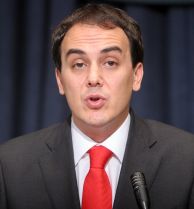- Serbia
Get to know Serbia
- Citizens
Culture and science
Health services
Pension and disability insurance
- Business
Employment
Economy
- Media
- Government
- Contact
Keep in touch
Contact form
Back
Keepin touch
Whether you have a question, comment, suggestion or any problem in the purview of the government, send us your message and we will try to respond as soon as possible. If your problem is not in our purview, we will forward your message to the relevant institution.
Q:
A:
First session of Assembly of Diaspora, Serbs in the Region to be held in Belgrade
Belgrade,
26 June 2010
Minister of the Diaspora Srdjan Sreckovic stated today that the first session of the Assembly of the Diaspora and Serbs in the Region will be held from 3 to 5 July in Belgrade. The Assembly will help expand and strengthen economic, political and cultural links between Serbs living abroad and their home country.
Speaking at a press conference, Sreckovic emphasised that the inaugural session of the Assembly will be held at the House of Parliament on 3 July and that it will be attended by top state officials.
On the same day a constitutive session will also be held, at which an Assembly President will be elected, announced Sreckovic, adding that Assembly delegates will meet with Serbian Patriarch Irinej the following day.
Three sessions, each devoted to a different subject will be held on 5 July. These sessions will be about economic development and investment by Serb communities abroad, improving the position of Serbs living abroad and the preservation of national identity. Later that day, Assembly delegates will meet with Prime Minister Mirko Cvetkovic, the Minister elaborated.
Under the Law on the Diaspora and Serbs in the region, the Assembly consists of 45 delegates. The Prime Minister, ministers of the diaspora, foreign affairs, youth, and religion will take part in the work of the Assembly. Representatives of the Serbian Orthodox Church, the Serbian Academy of Sciences and Arts, the Serbian Chamber of Commerce, Radio Television of Serbia and the Permanent Conference of Cities and Municipalities will also work together with the Assembly, he explained.
The policy towards communities abroad is becoming increasingly more important at a state level and the Assembly will be a symbol of the unity between the country and its citizens living abroad, regardless of their ethnic or religious identity, observed the Minister.
The Assembly will make strategic decisions and provide guidelines for joint work with state organs which are responsible for implementing the policy towards communities abroad and are making efforts to improve their position and for raising awareness about the preservation of national identity among the more than four million people living outside the country, he stressed.
Ways must be found to gain maximum benefit from the efforts of Serbs abroad to help their country, noted Sreckovic, adding that well organised Serbian communities, particularly in EU countries are of special importance for Serbia’s development.
On the same day a constitutive session will also be held, at which an Assembly President will be elected, announced Sreckovic, adding that Assembly delegates will meet with Serbian Patriarch Irinej the following day.
Three sessions, each devoted to a different subject will be held on 5 July. These sessions will be about economic development and investment by Serb communities abroad, improving the position of Serbs living abroad and the preservation of national identity. Later that day, Assembly delegates will meet with Prime Minister Mirko Cvetkovic, the Minister elaborated.
Under the Law on the Diaspora and Serbs in the region, the Assembly consists of 45 delegates. The Prime Minister, ministers of the diaspora, foreign affairs, youth, and religion will take part in the work of the Assembly. Representatives of the Serbian Orthodox Church, the Serbian Academy of Sciences and Arts, the Serbian Chamber of Commerce, Radio Television of Serbia and the Permanent Conference of Cities and Municipalities will also work together with the Assembly, he explained.
The policy towards communities abroad is becoming increasingly more important at a state level and the Assembly will be a symbol of the unity between the country and its citizens living abroad, regardless of their ethnic or religious identity, observed the Minister.
The Assembly will make strategic decisions and provide guidelines for joint work with state organs which are responsible for implementing the policy towards communities abroad and are making efforts to improve their position and for raising awareness about the preservation of national identity among the more than four million people living outside the country, he stressed.
Ways must be found to gain maximum benefit from the efforts of Serbs abroad to help their country, noted Sreckovic, adding that well organised Serbian communities, particularly in EU countries are of special importance for Serbia’s development.
-
 Belgrade, 22 January 2025
Belgrade, 22 January 2025Egypt one of Serbia’s closest partners on international stage
-
 Belgrade, 9 July 2024
Belgrade, 9 July 2024Support for 104 associations in diaspora that preserve Serbian language, culture
-
 Belgrade, 15 April 2024
Belgrade, 15 April 2024Competition for StarTech grants open until 31 May
-
 Belgrade, 2 October 2023
Belgrade, 2 October 2023Serbia respects Resolution 1244 and will do everything to preserve peace
-
 Belgrade, 13 September 2023
Belgrade, 13 September 2023Day of Serbian Unity to be celebrated outside borders of Serbia, Republika Srpska for the first time
-
 Belgrade, 8 August 2023
Belgrade, 8 August 2023RSD 24.2m in state aid paid out to citizens affected by storm
-
 Belgrade, 17 June 2023
Belgrade, 17 June 2023Belgrade is doing everything to preserve peace in Kosovo and Metohija
-
 Belgrade, 15 June 2023
Belgrade, 15 June 2023Slovenia will continue to support Serbia on its way to EU
-
 Belgrade, 5 May 2023
Belgrade, 5 May 2023Emergency measures, tightening of conditions for possessing weapons
-
 Belgrade, 3 May 2023
Belgrade, 3 May 2023Three days of mourning in Serbia over tragedy at Vladislav Ribnikar primary school


